|
|
|
Sort Order |
|
|
|
Items / Page
|
|
|
|
|
|
|
| Srl | Item |
| 1 |
ID:
144481


|
|
|
|
|
| Summary/Abstract |
ASEAN will form on December 31, 2015, the ASEAN Community, which will try to integrate 10 very heterogeneous countries into “one family”. On one hand, historical developments and security concerns led to a rather nationalistic position of the individual countries, and on the other, developments related to “non-traditional security” (NTS) issues are forcing a rethinking of hard-line positions in favour of a regional maritime approach. Whilst in many political and academic circles the term “regional resilience” is regularly used, the understanding ranges from the interpretation that this is a new Chinese wording for justifying the increase of the military and maritime power of the country, via the claim that the “new” security approaches are just emerging after the end of the Cold War, to the differentiating theory debate about different political approaches to international relations and the NTS issues. This article explores the historical development of NTS threats and then addresses some risks for the ASEAN Community 2015 as well as providing answers to the ASEAN 2015 three-pillar strategy of the ASEAN Political–Security Community (APSC), the ASEAN Economic Community (AEC) and the ASEAN Socio-Cultural Community (ASCC). The article will explore a strategic approach rather than operational issues to address certain challenges within this strategy, and will discuss some maritime implications.
|
|
|
|
|
|
|
|
|
|
|
|
|
|
|
|
| 2 |
ID:
151987


|
|
|
|
|
| Summary/Abstract |
Since the Asian financial crisis, the Association of Southeast Asian Nations (ASEAN) has sought to reorient itself towards becoming a ‘people-oriented’ association. Democratic transitions in the region and increased demands from civil society to be actively involved in regional governance have prompted ASEAN to develop forms of participatory regionalism. In practice, however, the rhetorical aspirations of ASEAN have not often matched the level of participation or support expected by civil society organisations. It has often been the case that ASEAN's decisions, especially those related to sensitive issues, have been influenced by external pressure as opposed to participatory mechanisms. The aim of this article is to determine to what extent participatory mechanisms impact ASEAN's approach to non-traditional security. By doing so, the authors combine two key elements central to a ‘people-oriented’ approach to regionalism: the incorporation of deliberative and participatory processes and the acknowledgement of transboundary security issues which require cooperation to move beyond state-centric approaches. This article explains that despite the rhetorical emphasis on participatory regionalism, it continues to be the case that regional civil society organisations and non-state actors have limited capacity to influence ASEAN. By providing a critical analysis of influences on ASEAN's non-traditional security policies, the authors offer a modest yet valuable contribution to the emerging literature on ASEAN's ‘people-oriented’ regionalism and advance a nuanced understanding of ASEAN's participatory mechanisms.
|
|
|
|
|
|
|
|
|
|
|
|
|
|
|
|
| 3 |
ID:
150586
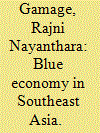

|
|
|
|
|
| Summary/Abstract |
While the term “blue economy” has found increasing traction with a variety of stakeholders (both state and non-state) in the recent past, a working definition of the concept at a regional or global level is yet to be arrived at. This paper begins with a brief examination of the concept of blue economy, followed by a discussion of blue economy initiatives undertaken or aspired towards at the regional level of Southeast Asia. In doing so, three fundamental propositions are made: First, the prospects for blue economy in Southeast Asia remain optimistic despite difficulties in collective action posed by the “ASEAN Way”, an obstacle which appears to have been considerably overcome in the launching of the ASEAN Economic Community (AEC) in 2015. Second, Indonesia’s growing economic and political profile allows it to assert the reins of regional (and even global) leadership on blue economy, without necessarily limiting itself to the Association of Southeast Asian Nations' (ASEAN) means and mechanisms. Third, while traditional security issues, both between Southeast Asian and extra-regional powers and within Southeast Asia over outstanding sovereignty and jurisdictional disputes, may impede cooperation on tackling non-traditional (maritime) security issues in the region, they may not prove as formidable an impediment against the successful realisation of blue economy initiatives.
|
|
|
|
|
|
|
|
|
|
|
|
|
|
|
|
| 4 |
ID:
153114
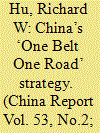

|
|
|
|
|
| Summary/Abstract |
This article examines One Belt One Road (OBOR) strategic implications for India. It is argued that the
implications need to be considered within the framework of the future development of the China–India
relationship. The relationship is largely constrained by and embedded in the security dilemma at the
present time. Taking the opportunity offered by the OBOR initiative, China and India should explore
building a ‘new model of major power relationship’ between the two countries. While the border issue
and regional security rivalry may not find an easy way out, it should not impede the leaders of the two
countries from expanding the areas of cooperation and building up strategic trust between the two peoples.
Beijing and New Delhi can and should find more areas of cooperation on non-traditional security issues,
such as food security, water, energy, strategic metals, common concern over environmental protection and
climate change and reforming the post-war international economic order.
|
|
|
|
|
|
|
|
|
|
|
|
|
|
|
|
| 5 |
ID:
089144
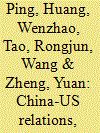

|
|
|
|
|
| Publication |
2009.
|
| Summary/Abstract |
The China-US relationship is one of the most important bilateral relationships in the world, and it is progressively maturing. Non-traditional security threats are expanding the shared interests of China and the US. The two countries have developed more realistic views of each other than they had decades ago, and this is making military relations more practical. The two are also interdependent in the economic realm, whether they like it or not, and therefore must work together to succeed in handling the current economic crisis. Connected to this economic challenge is that of climate change, an issue which the US must handle wisely in its relations with China. In addition, traditional security and peace issues will remain important, some even sensitive and difficult, in relations in the near future. The improved relationship towards which China and the US are moving will contribute substantially not only to bilateral relations but also to global peace and order.
|
|
|
|
|
|
|
|
|
|
|
|
|
|
|
|
| 6 |
ID:
158057
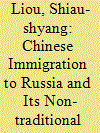

|
|
|
|
|
| Summary/Abstract |
Russia and China rapidly restore communication after the Cold War, but the Chinese immigration issue is also widely exaggerated and even described as “Yellow Peril again” in Russia. The so-called Yellow Peril is not only a Russian object perception but also a cross-generational conflict between Russia and China. Furthermore, it will be related to the subsequent development of the Russian Far East and Siberia. The Chinese immigration constitutes psychological and survival non-traditional security impacts on Russia and also forms some kind of social competition with Russians. It is vital for Russia to cooperate with its eastern neighbor to accelerate the development of the Russian Far East and Siberia, but national security and social stability are the prerequisites for cooperation. Nevertheless, it is more significant to rebuild self-confidence of the Russians in the Russian Far East and acknowledge that the East will not be a threat to Russia. As long as Russia realizes that it can enjoy unlimited possibilities in the East, the non-traditional security impacts caused by the Chinese immigration will automatically alleviate and even disappear. Today, most Russians are trapped in the dilemma of welcoming or refusing the Chinese immigrants; however, cultural exchange still has some effects and at least causes Russians to begin to positively treat the Chinese immigration and consider whether to accept China and cooperate with China.
|
|
|
|
|
|
|
|
|
|
|
|
|
|
|
|
| 7 |
ID:
099693


|
|
|
|
|
| Publication |
2010.
|
| Summary/Abstract |
This essay is a contribution to the discussion on human and non-traditional security (NTS) versus development by looking at the threat of climate change. There is overwhelming evidence that mankind's survival is at stake if collective action does not stop global warming. The UN Security Council (UNSC) discussed this threat in 2007. There are many ways in which climate change is threatening human security. However, the possible impacts are so varied and causal links to conflict are so difficult to establish that it is not logical to define climate change as an NTS on the basis of the nature of the threat only. A focus on the plausible sequence of threats and the means to deal with them at various points in time provides a more appropriate framework to understand that climate change is both a development issue and a human security threat. Climate change is an example of the development-security nexus and underlines the importance of using, in a coherent fashion and at various points in time, different and multilateral policy tools to tackle it. These instruments can range from typical development policy tools like Official Development Assistance (ODA) to the use of traditional security instruments, such as military force. Arguably, other threats could also be looked at from such a "threat sequencing" perspective. This approach thus allows for the explanation of relations between development, human security and traditional security and can be tested against other kinds of NTS.
|
|
|
|
|
|
|
|
|
|
|
|
|
|
|
|
| 8 |
ID:
053919
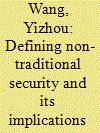

|
|
|
|
|
| Publication |
Sep-Oct 2004.
|
|
|
|
|
|
|
|
|
|
|
|
|
|
|
|
| 9 |
ID:
148637
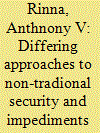

|
|
|
| 10 |
ID:
135505


|
|
|
|
|
| Summary/Abstract |
The end of the cold war has changed the notion of security. In classical terms, security primarily means to defend and safeguard the territorial integrity and autonomy of the nation. In other words security envisages protection and welfare of the state from other neighboring states. But the process of globalization has changed the whole world “a global village”. States and communities have come together to promote their shared interests either forgetting or ignoring their differences. This changed environment has also led changes in the concept of security. The scope of the studies on security has therefore expanded with the emergence of diverse concepts like cooperative security, comprehensive security, human security, non-traditional security.
|
|
|
|
|
|
|
|
|
|
|
|
|
|
|
|
| 11 |
ID:
128320
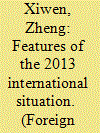

|
|
|
|
|
| Publication |
2013.
|
| Summary/Abstract |
The international situation in 2013 is on the whole stable. There is profound transformation in the world economy, deep adjustment in major-country relationships and accelerated evolvement of regional hotspots, leading to new major changes in the international political, economic and security landscapes.
|
|
|
|
|
|
|
|
|
|
|
|
|
|
|
|
| 12 |
ID:
153248


|
|
|
|
|
| Summary/Abstract |
‘Non-traditional security’ (NTS) is prominently featured in the agenda of the Association of Southeast Asian Nations (ASEAN) and other ASEAN-led institutions in the Asia-Pacific. ‘NTS’ brings together a series transnational and non-military security threats that are considered common among regional states, urgent for them to attend to, and non-sensitive all at the same time. This a priori makes it a self-evident focus of attempts to bring regional security cooperation ‘to a higher plane’. However, this paper reveals that the uncontroversial character of NTS is overestimated, by shedding light on the co-existence of divergent – and potentially contradictory – interpretations of its meaning and implications in ASEAN and the wider region. In a context where ASEAN's relevance to the pursuit of regional security is increasingly being measured against its (in)ability to provide a coherent approach to security challenges that affect the region, the contested nature of NTS has important implications for the grouping's resilience in the twenty-first century.
|
|
|
|
|
|
|
|
|
|
|
|
|
|
|
|
| 13 |
ID:
135570
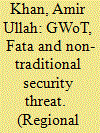

|
|
|
|
|
| Summary/Abstract |
The theoretical framework exploring security changed following the end of the cold war. In the post-cold war era, strategic thinkers and policy makers developed a new discourse that took into account non-military security issue like lack of healthcare, poverty, illiteracy, unemployment, poor food, poor sanitation system, poor governance and environmental issues as non-traditional security issue. This innovative paradigm shift has helped expand the horizon of security studies. The contribution of Copenhagen school is noteworthy in this connection.
|
|
|
|
|
|
|
|
|
|
|
|
|
|
|
|
| 14 |
ID:
105972


|
|
|
|
|
| Publication |
2011.
|
| Summary/Abstract |
Are there serious political-security conflicts between Association of Southeast Asian Nations (ASEAN) and India that could affect deepening relations? The strengthening of ASEAN and India's cooperation has already bore fruit with the implementation of the ASEAN-India free trade area. However, political security relations have not been fully examined especially if there are possibilities of potential conflicting policy directions. This article aims to contribute to further understanding of ASEAN and India's political and security relations through ASEAN's non-traditional security priorities in assessing potential threats to the region. There are indeed policy areas where ASEAN and India do not see eye to eye such as on issues of nuclear proliferation and human rights. However, because of the mutuality of interest between them, potential conflicts can be resolved.
|
|
|
|
|
|
|
|
|
|
|
|
|
|
|
|
| 15 |
ID:
103829


|
|
|
|
|
| Publication |
New Delhi, Observer Research Foundation, 2010.
|
| Description |
206p.
|
|
|
|
|
|
|
|
|
|
|
|
Copies: C:1/I:0,R:0,Q:0
Circulation
| Accession# | Call# | Current Location | Status | Policy | Location |
| 055925 | 303.625/IND 055925 | Main | On Shelf | General | |
|
|
|
|
| 16 |
ID:
151693


|
|
|
| 17 |
ID:
065476


|
|
|
| 18 |
ID:
164140
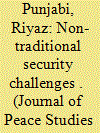

|
|
|
| 19 |
ID:
144907


|
|
|
|
|
| Summary/Abstract |
The rise of China raises questions about international order and whether traditional power structures will be transformed peacefully or confrontationally. Actively engaged in trade and investment activities with its Southeast Asian neighbourhood, China has been exerting political influence on many Southeast Asian states, cleaving regional cohesion and raising levels of tensity in the region. This article presupposes that within so-called non-traditional security (NTS) areas, there is room for China and Southeast Asian countries to circumvent the political tensions, to some extent. It presumes that NTS issues facilitate greater interaction with/on China for Southeast Asian states, including enhanced European Union (EU)-Association of Southeast Asian Nations (ASEAN) engagement on China. Recognising the increasing and rather underexplored importance of the NTS perspective on the official and scholarly levels, this article delves into the rhetoric of NTS from a European perspective with particular view towards the South China Sea issue to demonstrate the use and utility of the NTS concept in the EU-ASEAN context against the backdrop of China's rise.
|
|
|
|
|
|
|
|
|
|
|
|
|
|
|
|
| 20 |
ID:
098871
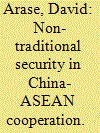

|
|
|
|
|
| Publication |
2010.
|
| Summary/Abstract |
The institutionalization of China-ASEAN non-traditional security cooperation is underappreciated, even though its significance should be apparent to Western analysts. Appreciating China-ASEAN non-traditional security cooperation leads to the realization that it has strategic significance, and that the broader China-ASEAN multilateral process is the most institutionally developed expression of East Asian regionalism today.
|
|
|
|
|
|
|
|
|
|
|
|
|
|
|
|
|
|
|
|
|